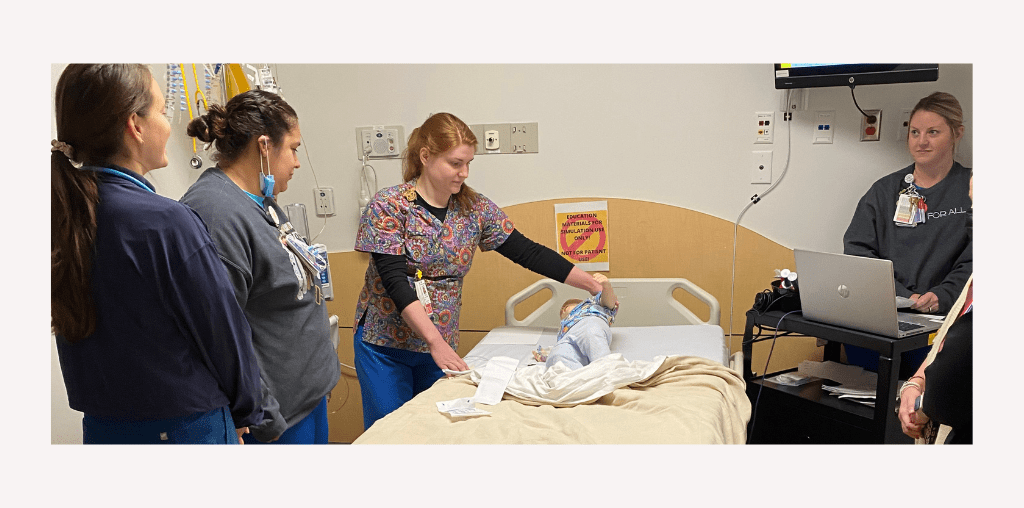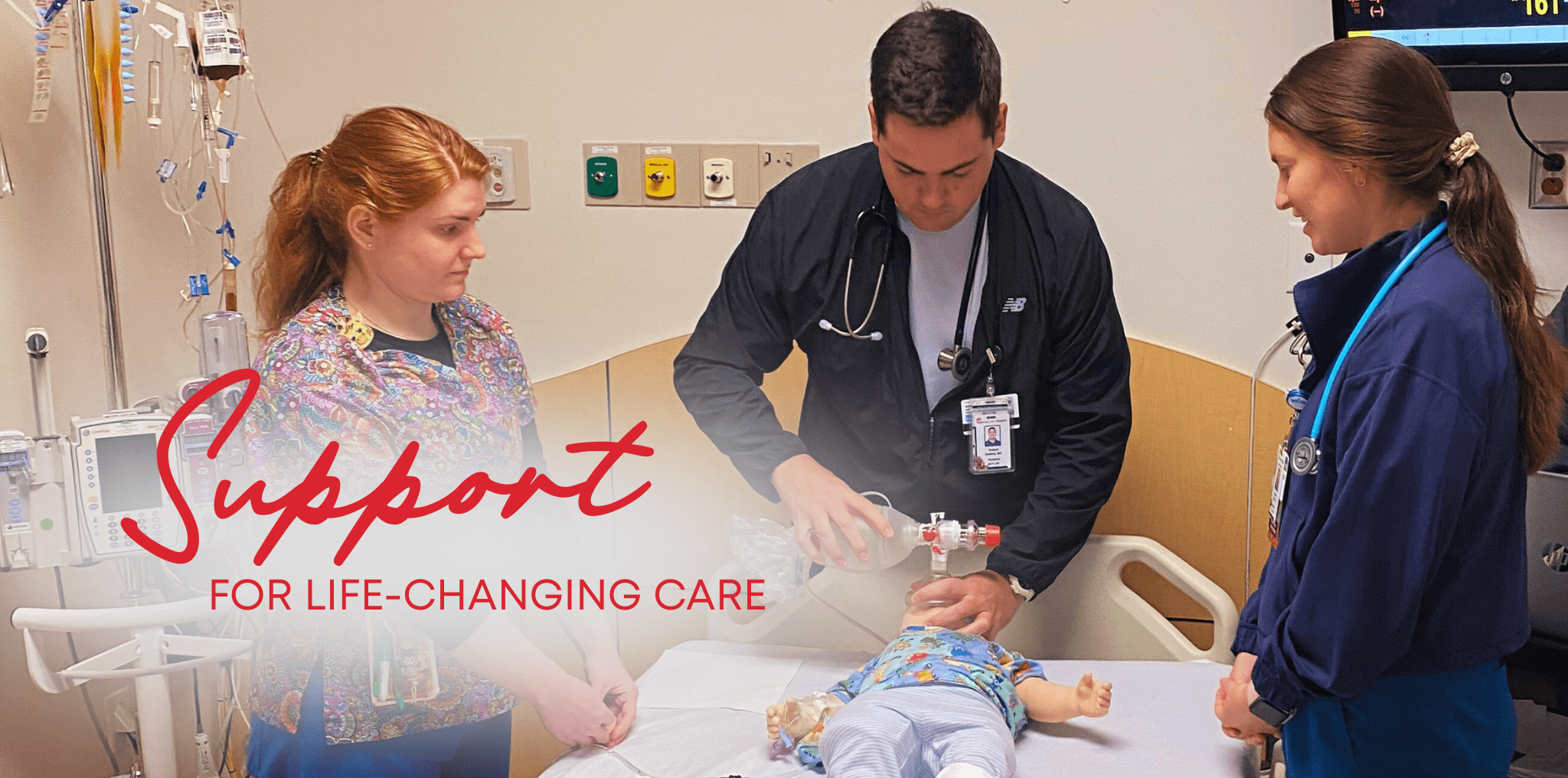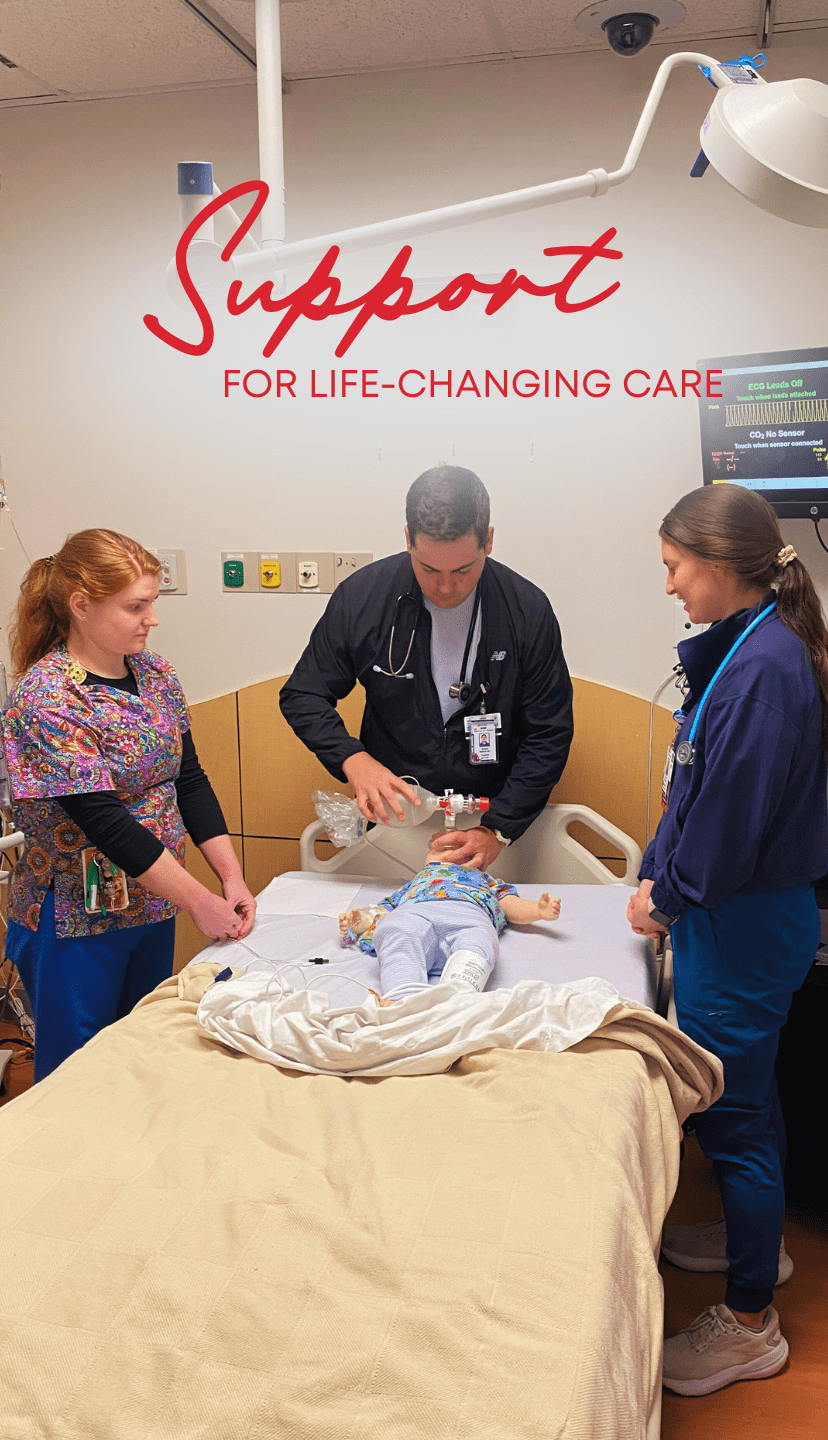5 Ways Texas Children’s Helps Hematology-Oncology Nurses Stay Ahead of Rapidly Changing Treatments
For nurses in pediatric hematology-oncology, staying current is essential. New treatments, clinical trials and complex care protocols are always emerging, and patients and families depend on nurses to guide them safely through every step. At Texas Children’s Cancer and Hematology Center, our nurses are equipped to lead.
Here are five ways Texas Children’s helps pediatric hematology-oncology nurses build expertise, stay informed and grow meaningful careers.
1. Comprehensive Education Starts on Day One
Education is woven into the experience of nurses new to our Cancer and Hematology Center from the moment they step onto the unit. Every new hematology-oncology nurse receives a structured orientation supported through regular check-ins with preceptors and educators.
“We created an orientation road map that breaks down what they should try to achieve each week,” says Ashley Makara, inpatient nurse educator. “We meet with all of our orientees and their preceptors every other week, if not more frequently. It creates a safe space and open dialogue, so nobody reaches the end of orientation still unsure of something.”
This model is especially important for incoming nurses who don’t have pediatric hematology-oncology experience. Some may be new graduates; others are transitioning from different units or adult care. Regardless of background, the onboarding process is designed to close knowledge gaps and build confidence.
2. Certification Support and Ongoing Training
All hem-onc nurses at Texas Children’s complete the Association of Pediatric Hematology-Oncology Nurses (APHON) Chemotherapy/Biotherapy Provider Course—a two-day, in-house program that prepares them to safely administer chemotherapy and biotherapy. Beyond initial certification, nurses also complete annual competencies to stay sharp and safe.
In addition to APHON, nurses attend a series of core classes designed to deepen their understanding of common diagnoses and treatment protocols seen on the unit. “We just launched a new format for our core training,” says Ashley. “It consists of four 4-hour courses taught by a mix of inpatient educators and outpatient coordinators. Each class focuses on specific diagnoses and the treatment protocols associated with them.”
These classroom-style sessions reinforce clinical knowledge and give nurses a structured way to grow their expertise, whether they’re new to the field or continuing to develop specialized skills.
Texas Children’s also fully supports nurses pursuing their Certified Pediatric Hematology-Oncology Nurse (CPHON) credential. Exam prep is covered through a review course, and nurses participate in the FreeTake program for exams and renewals.
“Regardless of whether nurses have prior pediatric or chemotherapy experience,” says Ashley, “We make sure every nurse gets the training and support they need to feel confident and safe administering these medications.”

3. Weekly Onsite Simulation Training
Every Thursday, nurses in the Cancer and Hematology Center participate in simulation-based training right on the unit. Scenarios are rotated weekly and designed to reinforce skills that may not be used every day but can make a lifesaving difference when needed.
“One of our simulations is a seizure scenario,” says Ashley. “We don’t see seizures often, but sometimes the medications our kids need can cause side effects like seizures. We had done that simulation one week, and the very next day a patient had a seizure. The nurses came back and said, ‘I’m so glad we did that—because I knew exactly what to do.’”
Simulation training is an essential part of the hospital’s learning ecosystem, complementing courses at the main Simulation Center and providing nurses with immediate, relevant practice on their home unit.
4. Adaptivity and Access to Clinical Standards Resources
With new medications and treatment protocols constantly being introduced, Texas Children’s ensures that nurses have quick access to the most up-to-date clinical guidance. Internal channels host tip sheets and nurse-created resources. Detailed road maps and practice standards help nurses navigate medication timing, side effects and safety precautions with precision.
A recent example is the integration of Blinatumomab—a 28-day continuous infusion biotherapy drug. Initially, patients were required to stay in the hospital for the full duration of treatment. Thanks to strong outcomes in clinical trials, the protocol has changed.
“Now our patients can go home with their infusion after just a couple days of monitoring, and that’s a huge shift,” Ashley remarks. “It impacts how we care for them and how we educate their families. Nurses need to be fully prepared, so we make sure the right information is always accessible and that support is available.”
In addition, nurses are encouraged to join national associations like APHON and Children’s Oncology Group (COG), where they can participate in forums, attend monthly education sessions, and stay current on new practices and research.
5. Career Growth and Professional Community Involvement
At Texas Children’s, nurses are empowered to grow. Expanded roles like charge nurse, central line nurse, and nurse instructor offer paths for specialization, leadership and mentoring. Each comes with tailored training and continued development.
Ashley shares the example of Amanda Kuehnel, who started as a new graduate and has quickly advanced. “She took every course we offered, became a preceptor, then stepped into the charge and central line nurse roles,” says Ashley. “Her positive attitude makes her a strong leader on the floor—staying on top of patient scores for our early warning system (CHEWS) and following up with each nurse.” Amanda’s journey reflects the opportunities for nurses to expand their skills, pursue new roles, and make an even greater impact.
Leadership also encourages participation in conferences, poster presentations, and internal leadership programs. Several nurses and leaders highlighted the impact of these opportunities on their growth.
Nurse Manager Rhea Noval reflects, “I am most grateful for being given the opportunity to participate in the Catalyst Nurse Leadership Program last year. It truly was a great opportunity to learn what leadership expectations were and what support was available from Texas Children’s to build a successful team.”
Professional development extends beyond the hospital as well. Kristen Waller, nurse manager for the Hematology/Oncology Clinic, shares: “I submitted an abstract to the annual APHON conference highlighting this project. This allowed me to represent Texas Children’s at the conference and network with pediatric hematology/oncology nurses from around the country. Our poster presentation won the People’s Choice Award at the conference, highlighting how important this work was.”
More Than a Job—The Cancer and Hematology Center Community
Nurses in the Cancer and Hematology Center often speak about the strength of the team around them. Open communication, shared accountability and a commitment to excellence create an environment where collaboration thrives.
“There’s a real sense of family here,” says April Robinson, infusion room nurse. “We support each other through the good days and the challenging ones. It’s a fast-paced, fulfilling environment filled with laughter, meaningful connections, and a team that feels more like family.”
For anyone looking to grow in pediatric hematology-oncology nursing—whether you’re just beginning or looking for a new chapter—Texas Children’s offers a place to thrive doing work that makes a life-changing difference for patients and their families.
Join Our Team
Discover pediatric hematology-oncology nursing opportunities at Texas Children’s and join a team that invests in your growth every step of the way. Explore careers at Texas Children’s Hospital today.





